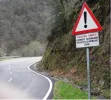- Time of past OR future Camino
- May 2023: Via Francigena, Lucca to Rome
How often will we encounter Basque, or other regional languages on the Camino? And more importantly, has anyone tried to learn the basics, and what was the reception?
It looks like you'd spend about two weeks in Basque-speaking regions between the Chemin Saint Jacques and the Camino Francés. If it's something that we'd hear daily at the coffee shops and albergues - and if the locals were receptive to visitors trying to speak - then I think it would be fun to learn the basics of Basque / Euskara. But I also don't want to put too much time into it if it's a language that we'd rarely actually get to use.
I have similar questions about Galego, Occitan, or the other regional languages we might encounter.
(I know that it's a hard language, but I'm a bit of a language nerd, so I really do mean it would also be fun ... )
It looks like you'd spend about two weeks in Basque-speaking regions between the Chemin Saint Jacques and the Camino Francés. If it's something that we'd hear daily at the coffee shops and albergues - and if the locals were receptive to visitors trying to speak - then I think it would be fun to learn the basics of Basque / Euskara. But I also don't want to put too much time into it if it's a language that we'd rarely actually get to use.
I have similar questions about Galego, Occitan, or the other regional languages we might encounter.
(I know that it's a hard language, but I'm a bit of a language nerd, so I really do mean it would also be fun ... )




















